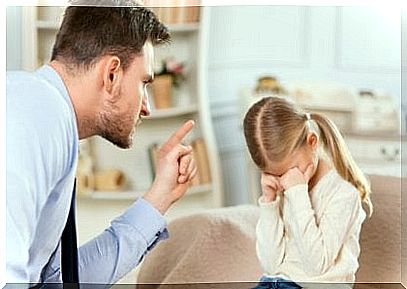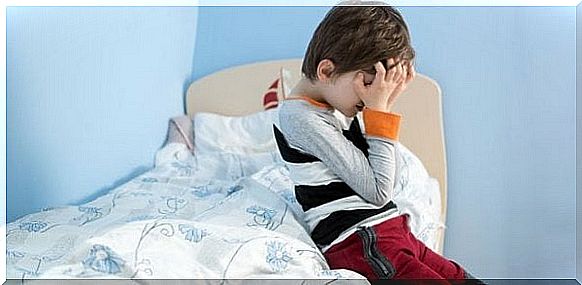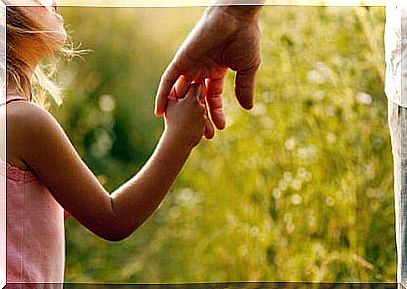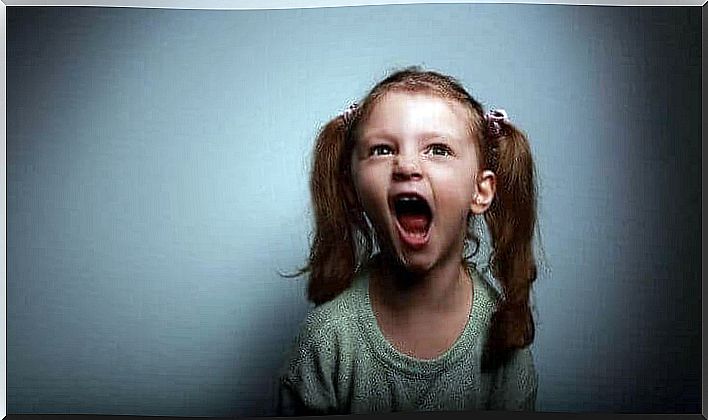Side Effects Of Punishment In Children

When we prevent our child from going to their favorite singer’s concert or ban them from using their computer for a couple of days because of their behavior, we are trying to penalize misconduct. In fact, punishment in children tries to suppress a series of unwanted actions. There are two main advantages of punishment. On the one hand, it has a very quick effect and on the other hand, it eliminates inappropriate behaviors and rearranges the desired behaviors.
However, the punishment of children produces a series of later side effects that are often not recognized by adults. This series of reactions, mostly emotional and behavioral in nature, make us think that punishment may not be the best way to make bad behavior go away or decrease.
Positive punishment
This control technique is used to suppress some unwanted behavior. Concretely, we will focus on what is known as positive punishment. When we provide aversive stimulation understood as such, it has unpleasant consequences for the recipient.
An example of this type of conditioning could be that of a child who constantly bit his nails and then applies a very bitter product to stop doing so. So every time he brings his fingers to his mouth, he will have an unpleasant feeling. If he repeats it often, he will eventually give up the habit to no longer suffer from this bitterness.

Effectiveness of punishment in children
In order for the correction to be as effective as possible, a series of variables must be kept in mind:
- Intensity : The relationship between intense punishment and its effectiveness is straightforward.
- Duration : when the duration is extended, the effectiveness seems more guaranteed.
- Contiguity : Failure to punish immediately after the act or behavior to be eliminated decreases the effectiveness of the punishment. You don’t have to wait long to apply aversive stimulation.
- Contingency : when the punishment is withdrawn before the bad behavior disappears. If the child stops being punished when his bad behavior has not completely disappeared, a short-term and rapid recovery from this behavior will take place. When children test their parents by asking, “Will you take the punishment off me?” », You have to know how to say no.
- Stimulating experience : if the punishment is new to the child, it has a much stronger effect than if it is familiar.
- Alternative : it is important to have alternative and substitutable responses to punishment.
In addition, the child should as far as possible repair the harm he has caused by his behavior. For example, a child is playing ball in the house when his parents have told him not to do it and unintentionally breaks a vase. The father punishes him by ordering him to clean, store and glue all the pieces of ceramic.
Disadvantages of punishment
The results of instrumental behavioralism (response-consequence) are very useful in practice. People act guided by motivations and interests and repeat the behaviors or attitudes for which they are rewarded. However, when this philosophy is transferred to childhood learning, punishing children is not always the right way to educate them. Some disadvantages are as follows.
Emotional responses
The emotional state of a person who has just been punished is usually very frustrating. It is associated with negative thoughts against the person administering or generating this feeling of helplessness. To do this, we can produce a series of emotional responses such as crying, screaming, kicking, anger… and even aggressive behavior. These responses are not only directed at the person who administered the punishment, but also at the rest of those present.

Signal stimulation
The person giving the punishment and other environmental stimuli can turn into unpleasant stimulation for the child or into red flags associated with unpleasant consequences. For this, the punished behavior will no longer appear in his presence, but in his absence. This side effect is the prototype of classroom behavior: children behave badly when there is no teacher in the classroom and behave better once the teacher enters.
Substitution by other inappropriate behaviors
Punishing children can promote the substitution of punished behaviors with other inappropriate behaviors. It is therefore important to apply the sanction with an alternative in order to be able to make the child understand what should and should not be done. Although the punishment makes it possible to suppress certain behaviors, its application causes behavior of flight or distance from the consequences specific to the latter.
“No” to physical punishment
The person giving a lesson can get carried away. Of course, when the physical punishment involves the administration of a slap or a spanking, the effect is doubly negative. First, it is punished by law because parents must be an example for children and the example is not to strike. Children learn everything they are shown. Bad habits and bad behavior are therefore not favorable, even when they are intended to correct their behavior.
Moderation and discipline
When there are several alternative responses, and one of them is the one that should not be performed, the performance of the other responses may be rewarded if they are incompatible with the unwanted action. This method known as differential reinforcement of incompatible behaviors gives better long-term results than punishment for adverse response.

It is important not to educate children in a constant exchange of rewards and prohibitions. They will not learn to value discipline. In fact, they won’t do it out of duty because they consider it important for the future, but because they know they can go out on weekends with their friends. It will give results, but they will have intrinsic motivation and memorizing without learning and only looking to achieve the prize.
Therefore, the punishment must be applied with care and moderation because its excess can turn the child into an anti-social being.









